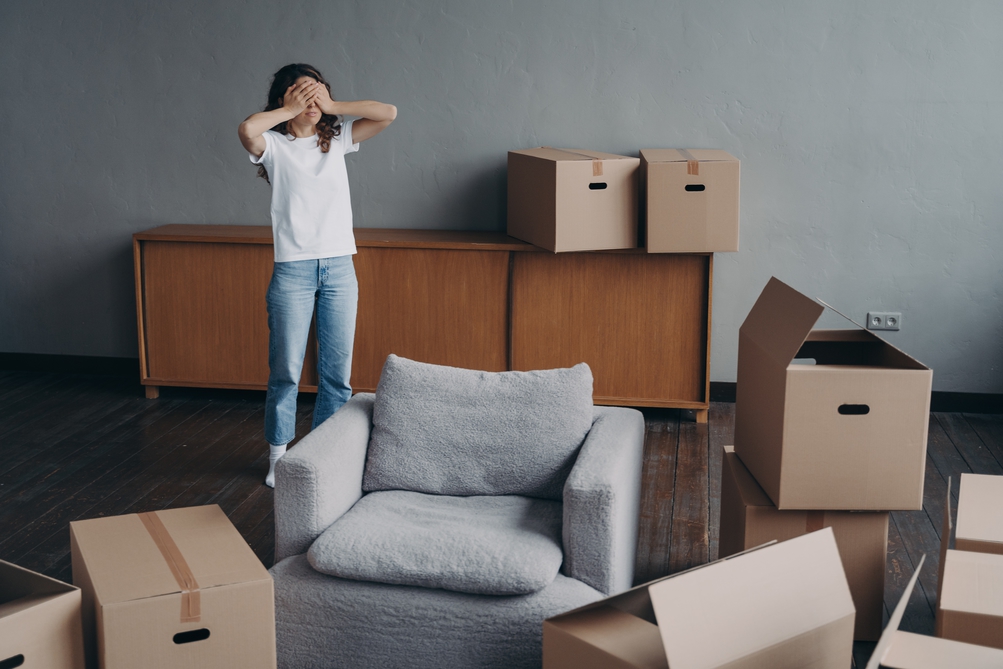
When you begin planning to move, you probably feel excited for the wonderful journey ahead. However, as you start to pack up your life, the stress of moving kicks in. Possessions pile up quickly, and sorting through everything becomes a monumental feat.
Moving stress is perfectly normal. As hard as it might seem, try to stay calm and focused. If you panic, not only will your move go more slowly, but you are also more likely to forget important objects during the moving process.

Keep reading to learn more about why moving is so stressful and how you and your family can better equip yourselves to handle it.
Why Is Moving Stressing Me Out?
Moving is an emotionally draining process. The reasons you may feel the stress of moving include:
- Significant life changes
- Lack of time
- Financial commitment
Let’s break down why these three problems lead to the emotional stress of moving.
Significant Life Changes
Humans are creatures of habit. We slip into daily routines, eat only at our favorite restaurants, and sit in our preferred chairs. Your home is a natural part of your daily habits and a place to relax after a long day.
When you commit to a new space, you are likely changing about 50% of the stability you have in your daily routine. By changing your location, you have to adapt to a new area and possibly new friends or a new job.
By changing the home itself, you have to become accustomed to new rooms with new purposes. Even the layout of the house will change. It is normal to find change stressful, so long as you realize that it is for the best.
Lack of Time
Everyone knows that moving takes a lot of time and effort. However, you don’t truly understand how much it takes until you complete a move yourself. It’s easy to underestimate how much time moving will take. Even if you put other parts of your life on hold, moving is not relaxing.
Financial Commitment
Moving is expensive. Undergoing financial stress is likely the worst part about moving, as you must pay for a new space and the act of moving itself. The costs can add up quickly.
What Symptoms Are Related to the Stress of Moving?
There are four categories of symptoms related to moving:
- Emotional: You feel overwhelmed and anxious, making it difficult to relax. You may feel “relocation depression,” which causes feelings of sadness and desire to be alone. You might even grieve your home, particularly if you had good memories there.
- Behavioral: You may notice a shift in your personality, such as losing interest in your hobbies, getting frustrated quickly, or changing your eating habits. You may crave alcohol or other substances. You might avoid responsibilities.
- Physical: The stress of moving house can cause physical symptoms such as headaches, low energy, inability to sleep, aches and pains in the chest and other body parts, shaking, and easily getting sick.
- Cognitive: Cognitive symptoms include feeling cynical or pessimistic, easily losing focus, constant worrying, forgetfulness, flawed reasoning or judgment, and disorganization.
Let’s continue with some tips on how to deal with the stress and symptoms of moving.
How to Handle the Stress of Moving
Taking the stress out of moving is not easy, but it is possible. The best ways to handle symptoms associated with the stress of moving include:
- Acknowledge and accept your feelings
- Get organized
- Learn how to relax
- Think positively
- Get help from a specialist
Acknowledge and Accept Your Feelings
To conquer moving anxiety, you must first normalize it. Being stressed out during a move is a perfectly normal feeling that everyone experiences.
Get Organized
Make a checklist. Get rid of things that you don’t need. Set moving goals.
By organizing your move, you will know what to expect throughout the process, thus reducing stress. Always begin by decluttering so you can focus on the most important things to pack. Create a moving schedule that will keep you on track.
Think Positively
Though leaving behind good memories is difficult, it is necessary for personal growth. New experiences make life interesting and offer new windows of opportunity.
Get Help from a Specialist
If you’re tackling a move by yourself and wondering why moving is so stressful, seek out help. You can always contact a moving company to help you pack and move. If your moving stress symptoms persist, seek out a therapist.
How to Deal with the Stress of Moving with Children
Your children may be overwhelmed and upset during a move. It’s important to teach them how to handle the stress of moving by teaching healthy anger and anxiety management techniques. Here are a few suggestions to help your children during a move:
- Open the conversation gently: If you haven’t told your child yet, be sure to introduce the topic gently. They may have an outburst or desire time alone, so let them process the news.
- Answer their questions: Children are in a different developmental stage than adults. They will likely ask a string of questions that may seem unnecessary or excessive. Be patient and guide them through the process.
- Help them handle anger or stress: Though you may have prepared yourself for a move, it’s big news for your child. Acknowledge their frustration patiently and explain the move positively.
- Make them part of the process: Let your children participate in small decisions. Allow them to choose their room and the decorations in it. Let them pick colors in one room or furniture in another.
Help Yourself De-Stress by Hiring a Moving Company
If you need help handling the stress of moving, contact Jordan River Moving & Storage. We offer services for local and cross-country moves, as well as help packing if the job is too large to handle. Call any of our locations at 1-877-611-0808.
Areas We Serve
- Kirkland, WA
- Vancouver, WA
- Columbia, SC
- Bronx, NY
Related Articles
Moving To Australia
Moving To Europe From USA
How To Pack Glasses For Moving




